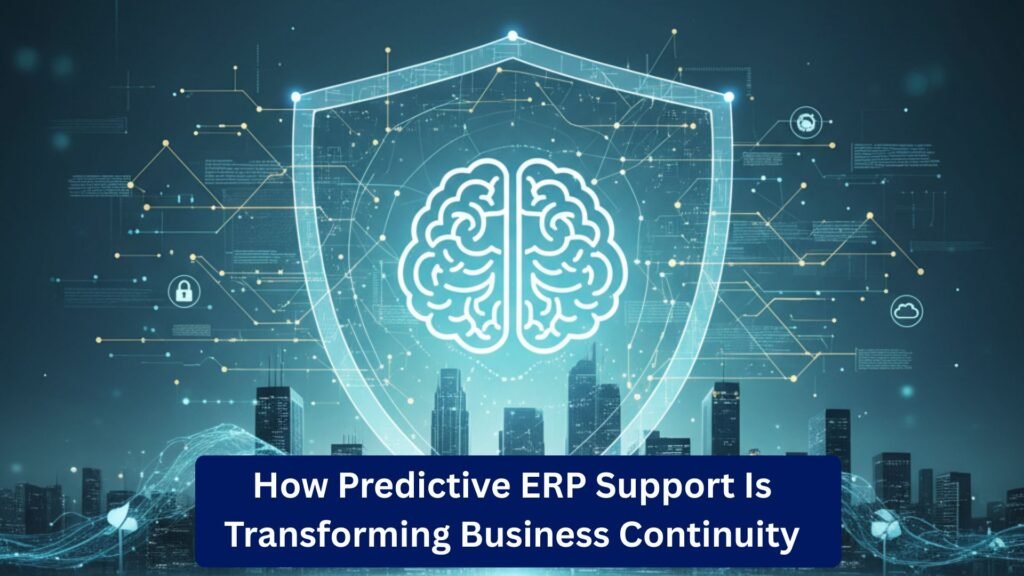How Predictive ERP Support Is Transforming Business Continuity
In today’s data-driven world, businesses cannot afford unexpected downtime, performance bottlenecks, or system failures—especially when their operations rely heavily on Enterprise Resource Planning (ERP) systems. Whether managing finances, inventory, customer relationships, or supply chain processes, modern enterprises depend on ERP solutions to maintain efficiency and profitability. But what happens when an ERP system slows down, crashes, or becomes vulnerable to disruptions? For years, companies relied on reactive and preventive support models—fixing issues after they occurred or performing routine maintenance to avoid them. However, the rise of artificial intelligence (AI), machine learning (ML), and data analytics has paved the way for a smarter approach — Predictive ERP Support. This next-generation support model doesn’t just monitor systems; it predicts issues before they occur, ensuring business continuity, performance stability, and operational resilience. Let’s explore how predictive ERP support is revolutionizing the way organizations maintain uptime, reduce costs, and secure their digital future. 1. What Is Predictive ERP Support? Predictive ERP support is an AI-driven support model that uses data analytics, automation, and machine learning to identify potential system issues before they affect business operations. Unlike traditional ERP support models, predictive support continuously collects and analyzes performance data from ERP systems—tracking everything from server health and transaction patterns to user activities and integration logs. By spotting trends and anomalies early, it can automatically alert support teams or trigger self-healing mechanisms to resolve problems proactively. In essence, predictive ERP support shifts the paradigm from reactive troubleshooting to preventive intelligence — ensuring maximum uptime and seamless operations. 2. The Evolution: From Reactive to Predictive ERP Support To understand the value of predictive ERP support, let’s briefly look at the journey of ERP system maintenance over time. a. Reactive Support Reactive support is the oldest model, often described as a “break-fix” approach. The support team steps in only when an issue occurs—for example, a system crash or data error. While effective for minor problems, this model often leads to downtime, data loss, and user frustration. b. Preventive Support Preventive support introduced regular system checkups and scheduled maintenance. It’s better than reactive support but still relies heavily on human intervention and doesn’t always detect hidden risks. c. Predictive Support Predictive ERP support takes it a step further. It uses AI, real-time analytics, and automation to predict system anomalies, detect performance degradation, and mitigate risks before they disrupt operations. This transition marks a significant leap toward self-healing ERP ecosystems, where systems not only identify but also fix issues autonomously. 3. How Predictive ERP Support Works Predictive ERP support combines data science, monitoring tools, and intelligent automation. Here’s how it functions step-by-step: Step 1: Data Collection The system continuously gathers performance data from various sources—ERP modules, servers, databases, and integrations. Step 2: Data Analysis AI algorithms analyze the data to detect abnormal patterns or behaviors, such as slow response times, increased memory usage, or failed transactions. Step 3: Predictive Modeling Machine learning models use historical data to predict when a specific issue might occur—for instance, forecasting a database overload or a potential integration error. Step 4: Alerting and Automation Once a risk is detected, the system automatically sends alerts to support teams or triggers automated corrective actions (like rebooting services or reallocating resources). Step 5: Continuous Learning Over time, predictive support systems learn and improve, refining their accuracy and making future predictions more reliable. This process ensures 24/7 proactive monitoring and a continuous feedback loop for optimization. 4. Key Benefits of Predictive ERP Support a. Reduced Downtime By predicting and preventing issues before they occur, organizations experience fewer outages and disruptions. This ensures uninterrupted business operations and improved customer satisfaction. b. Faster Problem Resolution Automation enables immediate action when anomalies are detected, drastically reducing the mean time to repair (MTTR). c. Cost Efficiency Predictive support minimizes emergency maintenance costs and resource wastage. Businesses save significantly on unplanned downtime and post-failure recovery. d. Enhanced System Performance Continuous monitoring ensures ERP systems run optimally, maintaining performance across finance, sales, supply chain, and HR modules. e. Improved Business Continuity Since predictive support ensures ERP systems remain operational around the clock, it strengthens business continuity and resilience against disruptions. f. Data-Driven Decision Making Support teams can analyze predictive insights to identify recurring problems, plan upgrades strategically, and optimize infrastructure usage. 5. The Role of AI and Machine Learning in Predictive ERP Support Artificial Intelligence (AI) and Machine Learning (ML) are the core technologies driving predictive ERP support. Here’s how they help: a. Anomaly Detection AI algorithms analyze millions of data points to identify patterns that deviate from the norm—such as a sudden drop in processing speed or increased API latency. b. Predictive Maintenance Machine learning models forecast potential failures in hardware, network, or software components, allowing IT teams to intervene before damage occurs. c. Root Cause Analysis AI automates the identification of the root cause of issues, reducing manual investigation time. d. Intelligent Automation AI-powered bots can automatically perform repetitive support tasks—like restarting services or clearing temporary caches—without human intervention. Together, these technologies enable self-sustaining ERP ecosystems that continuously optimize performance while ensuring security and stability. 6. Predictive ERP Support and Business Continuity Business continuity refers to a company’s ability to maintain essential functions during and after a disruption. Predictive ERP support directly contributes to this by: In industries like retail, manufacturing, finance, and healthcare—where even an hour of downtime can cause huge financial losses—predictive support is becoming the backbone of continuity planning. 7. Predictive ERP Support in Microsoft Dynamics 365 Microsoft Dynamics 365 is one of the most advanced ERP ecosystems supporting predictive intelligence. It integrates seamlessly with Microsoft Azure, Power Platform, and AI services to provide end-to-end predictive support and insights. Key Predictive Features in Dynamics 365: Organizations using Microsoft Dynamics 365 ERP benefit from embedded predictive algorithms that anticipate system slowdowns, security risks, and integration failures — enabling proactive management and greater business continuity. 8. Industry Applications of Predictive ERP Support a. Manufacturing Predictive ERP support detects potential bottlenecks in production schedules, monitors machine health, and ensures supply chain reliability.
How Predictive ERP Support Is Transforming Business Continuity Read More »












